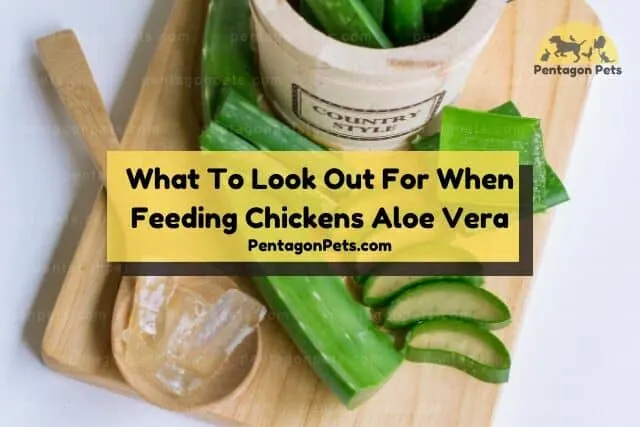Raising chickens can be a rewarding endeavor for many who appreciate the benefits of fresh eggs and the companionship these friendly birds provide. One essential aspect of maintaining the health and vitality of your flock is ensuring their diet meets their nutritional needs. However, many backyard chicken keepers might wonder if aloe vera and its many benefits for humans can be safely shared with their feathered friends.
Aloe vera, a succulent plant known for its medicinal properties, is commonly touted as a natural remedy for humans. Some people use aloe vera gel to soothe sunburns, treat skin conditions, or even promote hair growth. With such a wide range of applications, it’s no wonder that chicken keepers might be curious about its potential as a dietary supplement for their flock. In this article, we will explore the safety of aloe vera for chickens, potential risks, and better alternatives for meeting their nutritional needs.

Can Chickens Eat Aloe Vera – Is It Safe?
Aloe vera is a popular plant known for its medicinal properties and extensive use in skincare products. However, when it comes to chickens, the safety of aloe vera consumption becomes a crucial concern.
Aloe vera contains various nutrients and compounds, including vitamins, minerals, enzymes, and amino acids, which can be beneficial for humans. Nevertheless, the same may not necessarily apply to chickens. In fact, a component of aloe vera called aloin could potentially cause harm to chickens when ingested in large quantities. Aloin is a bitter, yellow substance found in the skin and latex of aloe vera leaves and has laxative properties, which can lead to digestive issues in chickens.
Therefore, it’s essential to understand that chickens may not process aloe vera the same way humans do. If a chicken accidentally consumes a small amount of aloe vera, it might not cause severe harm. However, allowing them to regularly feed on it could lead to potential health issues.
To ensure your chickens’ well-being, sticking to their regular diet is the best approach. A balanced diet for chickens includes grains, vegetables, fruits, and clean water. Providing a combination of these dietary sources will offer them the necessary nutrients for proper growth, development, and health.
Offering aloe vera to chickens is not recommended due to the presence of aloin. To maintain the health and safety of your chickens, focus on providing a balanced diet that incorporates grains, vegetables, and fruits. This will ensure they receive adequate nutrition and keep potential risks at bay.
Should You Give Chickens Aloe Vera To Eat?

Aloe vera is a succulent plant widely known for its medicinal properties and soothing effects on wounds, sunburns, and other skin irritations. However, when it comes to feeding aloe vera to chickens, caution should be exercised.
First of all, it is important to know that chickens are omnivores and consume a variety of insects, seeds, plants, and even small rodents. Their natural diet is highly diverse, and they can usually identify and avoid toxic plants. However, this is not always the case with domesticated chickens, as they might not have access to the same variety of forage as their wild counterparts.
This article was first published on August 11, 2023 by Pentagon-Pets.
There is limited research on the potential effects of aloe vera on chickens, but some anecdotal evidence suggests that chickens might avoid the plant due to its distinct taste and texture. Aloe vera leaves contain a bitter-tasting gel and a yellowish sap called latex, which could deter chickens from consuming the plant.
Moreover, aloe vera contains compounds called aloin and anthraquinones, which have laxative effects and can cause gastrointestinal issues in some animals. These compounds could potentially lead to diarrhea, dehydration, or other digestive problems if chickens were to consume large amounts of aloe vera.
On the other hand, aloe vera has several benefits for chickens, such as promoting healthy skin, boosting the immune system, and providing hydration. However, these benefits are best obtained when aloe vera is applied topically or given to chickens in small, infrequent amounts as a supplement.
It is not advisable to intentionally give chickens aloe vera to eat. While a small amount might not cause harm, there is the potential for gastrointestinal issues if the chickens consume large amounts of the plant. Instead, focus on providing a well-balanced diet with healthy grains, fruits, vegetables, and insects for optimal nutrition and health benefits.
What To Look Out For When Feeding Chickens Aloe Vera

Feeding aloe vera to chickens should be approached with caution, as certain parts of the aloe plant can be harmful to them. If you decide to incorporate aloe vera into your chickens’ diet, please observe the following guidelines to ensure their safety:
Choose the Right Part of the Plant: Always provide them with the inner gel, which contains the beneficial properties, and avoid the outer skin or latex layer. The latex can act as a strong laxative and cause digestive issues in chickens.
Wash the Aloe Vera Gel Thoroughly: Before giving your chickens aloe vera gel, make sure to rinse it under running water to remove any trace of the yellow latex or sap. This will ensure that you are only providing the inner gel, which is safe for consumption.
Moderation is Key: Introduce aloe vera into your chickens’ diet in small amounts, as too much can lead to adverse effects. Like any other treat or supplement, make sure that aloe vera does not account for more than 5% of your chickens’ total diet.
Monitor Your Chickens Closely: Observe your chickens closely after introducing aloe vera, especially during the first few days. Look out for any signs of digestive distress, such as diarrhea or vomiting. If you notice any adverse reactions, stop feeding your chickens aloe vera and consult a veterinarian.
In addition, be aware of the potential risks associated with aloe vera consumption by chickens:
- Contamination: Ensure that the aloe vera you are providing your chickens is free from pesticides or other toxic substances. Opt for organic sources, if possible, to minimize the risk of contamination.
- Allergic Reactions: Although rare, some chickens might be allergic to aloe vera. If you suspect an allergic reaction, discontinue feeding aloe vera and consult your veterinarian.
By following these guidelines and keeping a close eye on your chickens, you can safely introduce aloe vera into their diet and reap the potential benefits for their health.
Can Chickens Eat Aloe Vera Leaves?

Chickens can eat a variety of plant material, but when it comes to aloe vera leaves, caution is advised. Aloe vera is known for its numerous health benefits to humans, such as soothing skin irritations and promoting digestion. However, the effects of aloe vera on chickens may differ.
Aloe vera leaves have a thick, gel-like substance called aloe vera gel, which is considered safe for chickens to consume. The gel itself is rich in vitamins, minerals, and enzymes, which can contribute to the overall well-being of chickens. Nonetheless, the amount consumed should be minimal since excessive consumption may lead to digestive problems.
It is essential to be aware that aloe vera leaves also contain a latex-like substance called aloin, found beneath the outer layer of the leaves. Aloin is a potent natural laxative that can cause gastrointestinal distress and even diarrhea. Therefore, if chickens consume aloe vera leaves containing aloin, it might have adverse effects on their health.
When offering aloe vera leaves to chickens, it is crucial to take preventive measures. These include rinsing the leaves thoroughly to remove any traces of aloin, and only feeding them small amounts of the gel. Additionally, monitoring the chickens after they have consumed aloe vera is essential to check for any potential signs of distress. If there are indications of digestive issues, it is best to stop feeding aloe vera leaves to the birds and consult a veterinarian.
Pentagon Pet is the owner of this article that was first published on August 11, 2023.
While aloe vera leaves can be consumed by chickens, caution should be exercised to ensure that only the gel is offered to them, free from any aloin that may cause an upset stomach. Taking these precautions can provide a safe and healthy supplement for chickens, without putting their health at risk.
Can Chickens Eat Aloe Vera Plants?

Chickens can be curious creatures, and they often peck at various plants and objects in their surroundings. When it comes to aloe vera plants, the question of whether it is safe for chickens to consume arises. Aloe vera is known for its numerous health benefits for humans, but that doesn’t necessarily mean it’s suitable for chickens.
Aloe vera contains a compound called aloin, which can be toxic to some animals if ingested in large quantities. While small amounts might not cause harm, it is best to err on the side of caution and prevent chickens from eating aloe vera plants. This is because chickens have different digestive systems and might not be able to properly process the compounds found in aloe vera.
Furthermore, aloe vera plants have thick leaves with a protective layer that can be challenging for chickens to digest. This could potentially result in blockages in their digestive tracts.
To ensure the safety and well-being of your chickens, it is recommended to:
This article and its contents are owned by Pentagon Pets and was first published on August 11, 2023.
- Keep aloe vera plants out of their reach, or in a separate area where chickens cannot access them.
- Provide a well-balanced diet to your chickens, which includes a variety of grains, vegetables, and suitable fruits.
- Make sure that chickens have access to grit, as it aids in their digestion of fibrous materials.
- Monitor your chickens for any signs of illness or discomfort and consult with a veterinarian if you suspect that they have ingested aloe vera or any other potentially harmful substances.
In conclusion, while aloe vera is not considered a suitable food source for chickens, preventing access to the plants and providing a healthy diet for your flock will help you maintain their well-being and prevent any risk associated with consuming aloe vera.
